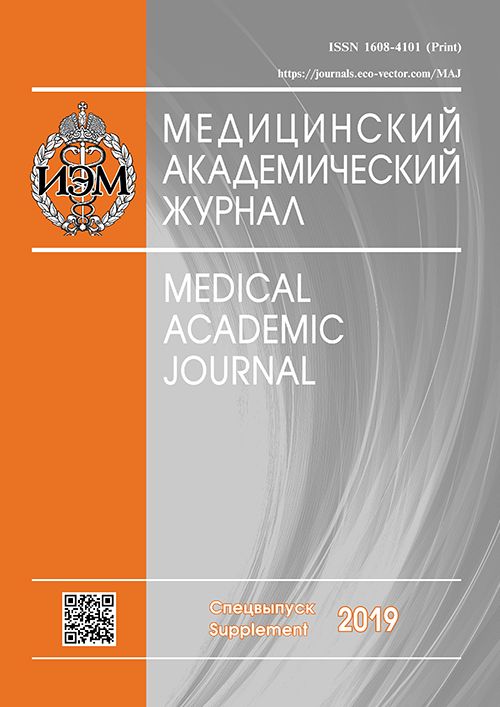CHANGES OF INTESTINAL MICROBIOME IN MULTIPLE SCLEROSIS ARE ASSOCIATED WITH IMMUNE SHIFT AND PSYCHOEMOTIONAL DISORDERS
- Authors: Abdurasulova IN1, Matsulevich AV1, Tarasova EA1, Kudryavtsev IV1, Nikiforova IG2, Serebryakova MK1, Miroshnichenko MI1, Ivashkova EV2, Tatarinov AE1, Ilves AG2, Ermolenko EI1, Bisaga GN3, Stolyarov ID2, Klimenko VM1
-
Affiliations:
- Institute of experimental medicine, Saint Petersburg
- N.P. Bechtereva Institute of the Human Brain of the RAS, Saint Petersburg
- Almazov National Medical Research Center, Saint Petersburg
- Issue: Vol 19, No 1S (2019)
- Pages: 51-54
- Section: Articles
- Published: 15.12.2019
- URL: https://journals.eco-vector.com/MAJ/article/view/19321
- ID: 19321
Cite item
Abstract
Full Text
About the authors
I N Abdurasulova
Institute of experimental medicine, Saint Petersburg
A V Matsulevich
Institute of experimental medicine, Saint Petersburg
E A Tarasova
Institute of experimental medicine, Saint Petersburg
I V Kudryavtsev
Institute of experimental medicine, Saint Petersburg
I G Nikiforova
N.P. Bechtereva Institute of the Human Brain of the RAS, Saint Petersburg
M K Serebryakova
Institute of experimental medicine, Saint Petersburg
M I Miroshnichenko
Institute of experimental medicine, Saint Petersburg
E V Ivashkova
N.P. Bechtereva Institute of the Human Brain of the RAS, Saint Petersburg
A E Tatarinov
Institute of experimental medicine, Saint Petersburg
A G Ilves
N.P. Bechtereva Institute of the Human Brain of the RAS, Saint Petersburg
E I Ermolenko
Institute of experimental medicine, Saint Petersburg
G N Bisaga
Almazov National Medical Research Center, Saint Petersburg
I D Stolyarov
N.P. Bechtereva Institute of the Human Brain of the RAS, Saint Petersburg
V M Klimenko
Institute of experimental medicine, Saint Petersburg
References
- Cryan JF, Dinan TG. Mind-altering microorganisms: the impact of the gut microbiota on brain and behaviour. Nat. Rev. Neurosci. 2012;13(10):701-712.
- Matsulevich AV, Abdurasulova IN, Tarasova EA, et al. Effect of course application of Enterococcus faecium L-3 on the psychoemotinal state of patients with multiple sclerosis. Med. Acad. Zh. 2017;17(3):38-46. (In Russ.).
- Abdurasulova IN, Tarasova EA, Ermolenko EI, et al. Multiple sclerosis is associated with the altered quantitative and qualitative composition of intestinal microbiota. Med. Acad. Zh. 2015;15(3):55-67. (In Russ.).
- Miyake S, Kim S, Suda W, et al. Dysbiosis in the gut microbiota of patients with multiple sclerosis, with a striking depletion of species belonging to Clostridia XIVa and IV clusters. PLoS One. 2015;10(9):e0137429.
- Jangi S, Gandhi R, Cox LM, et al. Alterations of the human gut microbiome in multiple sclerosis. Nat Commun. 2016;7:12015.
- Kudryavtsev IV, Ilves AG, Borisov AG, et al. CCR6-positive T-helper subsets from peripheral blood in multiple sclerosis. Cytokines and inflammation. 2016:15(2):166-172. (In Russ.).
- Abdurasulova IN, Matsulevich AV, Tarasova EA, et al. Enterococcus faecium L3 and glatiramer acetate ameliorate of experimental allergic encephalomyelitis (EAE) in rats by affecting different populations of immune cells. Beneficial microbes. 2016;7(5):719-729.
Supplementary files







